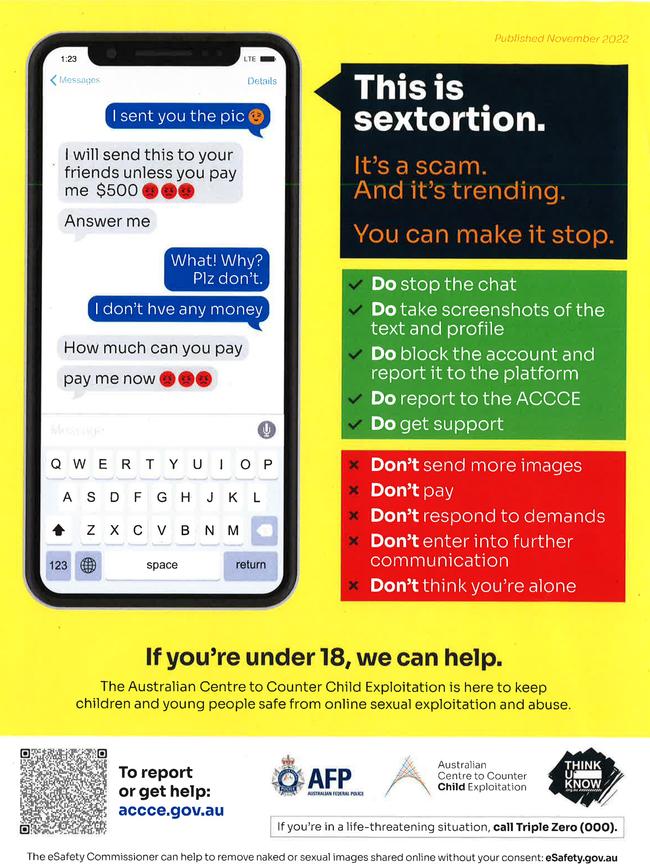A grieving mother has issued a warning to young men who are the targets of a growing online sextortion scam
Ryan Last thought he was chatting to a girl who was interested in him, but their intimate conversation quickly turned criminal.
Online
Don't miss out on the headlines from Online. Followed categories will be added to My News.
It was a school night in February 2022, and Ryan Last thought he was chatting with a girl who was interested in him.
When she sent him a nude picture and asked for one in return, he agreed.
“As soon as they received the picture, they demanded $5000 or they would post it online,” his mother Pauline Stuart told the I’ve Got News For You podcast.
Ryan dug $150 out of his college fund, hoping it would stop the scammer; but, Ms Stuart said, they knew there was more where that came from and the demands kept coming.
Hours later, the promising 17-year-old had taken his own life after falling victim to a cruel sextortion scam.

“We were in shock,” Ms Stuart said. “The police officers gave us the copy of his note and … you could tell that he was absolutely terrified.
“The fact that somebody could do that to a young kid to put that much fear into him that (he) would take (his) life … it makes me angry that someone thinks that money is more important than a child’s life.”
After the tragedy, Ms Stuart wants to warn teens to be careful with who they speak with or share intimate images with online, and parents to be aware of the rising new danger.
What is sextortion?
The Australian Federal Police-led Australian Centre to Counter Child Exploitation (ACCCE) and police from across the country have warned of a worrying rise in sextortion targeting young men like Ryan in Australia.
Sexual extortion – or sextortion - is a form of online blackmail involving threats to share intimate images or videos, sometimes coerced from an individual, unless they comply with certain demands, often monetary.
Australia’s eSafety commissioner Julie Inman Grant said scammers will approach young men posing as a young woman online and ask to engage in a “sexy chat” before taking them to another platform like Skype or FaceTime, and ask them to “perform sexual acts before the camera”.

But when that happens, the scammer will screenshot them and threaten to share the image to friends, family, even employers “unless they pay up” - often through crypto currently to make tracking them more difficult.
“It’s a massive global problem and we know that organised criminal networks are now behind this,” Ms Inman Grant. “They’ve realised that this is a very lucrative game.”
Some men who have reported being scammed to eSafety or the AFP have paid up to $10,000 in extortion fees.
The commissioner says the criminals have become “very clever about covering their tracks” and exploiting social media platforms like TikTok, Instagram and Snapchat to meet young men.

“These are very clever organised criminals that will be very patient in terms of grooming young men and gaining their trust, so please don’t be embarrassed,” Ms Inman Grant said for those who had been scammed.
“What we do at eSafety is we focus on delivering compassionate citizen service,” she continued. “We want young people to know that they can come to esafety.gov.au, we’ve dealt with literally thousands of these cases, we can talk them through their options and refer them on to either mental health services or the police if necessary.”
What do you do if you are scammed?
The commissioner recommends victims who are under 18 go to ACCCE or the AFP; while those over 18 should report the crime to eSafety’s image-based abuse hotline.
But the best prevention, she said, is to not send intimate images with people online, even if they have strong feelings for them.

“Because that’s what these people do, they manipulate and groom people,” Ms Inman Grant said.
“Do not share any intimate imagery with someone you’ve never met. You just don't know who’s on the other end of that account and you don’t know what their intentions are.”
Ms Stuart said it was important for young men caught in a scam to not pay any money and to come forward to police with records that are as detailed as possible. She also warned parents to talk to their kids about online safety.
“I was very, very close with my kids ... but (Ryan) felt at the time that he made a mistake and he was so scared that it would hurt us,” she said.
“He apologised for not being smart enough and not realising that these people were scamming him. So parents should talk to their kids and let them know that no matter what mistake that child makes you will be there for (them).
“I know my kid knew that we would be there, but he didn’t want to disappoint us.”
Originally published as A grieving mother has issued a warning to young men who are the targets of a growing online sextortion scam




